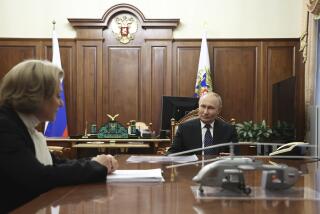Russia to Cut Back Troops in Chechnya
- Share via
MOSCOW — Claiming that the strife-torn republic of Chechnya is growing more stable in the weeks before a key referendum, Russian authorities announced Monday that modest troop withdrawals will start this week. But violent clashes with separatist rebels showed no letup.
Security guards battled with gunmen in a weekend clash involving the motorcade of Akhmad Kadyrov, chief of the Moscow-backed administration, Russian media reported.
Authorities released conflicting accounts of the battle. Some said that Kadyrov was present and that eight people -- four security men, three local policemen and one gunman -- were killed. Others said that Kadyrov was not in the motorcade and that although four of his bodyguards were injured, no one died.
Gen. Anatoly V. Kvashnin, chief of Russia’s general staff, told reporters in Grozny, the Chechen capital, that some Russian army units will begin to withdraw from Chechnya on Wednesday. About 1,000 soldiers are due to pull out this month without being replaced by fresh troops, authorities said. By official count, about 80,000 troops and special police are stationed in Chechnya, although independent analysts estimate the figure at up to 100,000.
A referendum on a new Chechen constitution that would pave the way for elections is scheduled for March 23. The vote is part of an effort by Russian President Vladimir V. Putin to undermine the legitimacy of Aslan Maskhadov, a separatist leader who was elected Chechnya’s president in 1997 under the present constitution. He is now a key rebel.
Chechens exercised a degree of autonomy in their Caucasus republic after defeating Russian troops in a 1994-96 war. Russian forces returned in 1999 and have battled guerrillas since.
Disputing critics who say it is impossible to hold a valid referendum during a war, Kvashnin insisted that the situation is “stable, normal and favorable for holding the referendum.”
The vote also aims to strengthen the Kremlin’s argument that the separatist guerrillas are terrorists.
“The referendum will strip them of the status of a national liberation movement,” Kvashnin declared. “There will be only mobsters left running about in the mountains. After the referendum, even the militants’ henchmen will be unable to say anything about their ostensibly legal status.”
That view may be wishful thinking, said Emil Pain, director of Moscow’s Center for Ethnopolitical and Regional Studies and a onetime advisor to former President Boris N. Yeltsin.
“It seems those who live in Chechnya won’t believe in the results of the coming referendum,” Pain said. “It won’t be a step toward legitimization.... Instead of holding a referendum, Russia should start peaceful negotiations.”
Russia could open talks with one leader, such as Maskhadov, and, if necessary, expand the negotiations to include other rebel commanders, Pain said.
On Monday, the Russian news agency Itar-Tass listed other incidents involving Chechen rebels it said had occurred in the last few days. Troops carrying out a “special operation” near the village of Tazen-Kale drew rebel fire and shot back, killing 25, the agency reported, citing an army statement.
In the city of Argun, separatists laid siege to a police station, and when troops came to the rescue, five rebels were killed, the news agency said. Two rebels were arrested trying to bring a portable antiaircraft system and grenade launcher into Grozny, in a suspected effort to bring down aircraft near the military base of Khankala, it added. Two more rebels were killed while carrying $1,000 in counterfeit U.S. bills, the news agency said.
In another indication of how Russia is struggling to assert authority, police and soldiers were hunting for a mobile TV transmitter operated by the rebels, Itar-Tass said.
The device can transmit over a three-mile radius, the news agency reported, and “rebels went on air several times in the past few days to broadcast statements by Maskhadov.”
*
Yakov Ryzhak of The Times’ Moscow Bureau contributed to this report.
More to Read
Sign up for Essential California
The most important California stories and recommendations in your inbox every morning.
You may occasionally receive promotional content from the Los Angeles Times.










